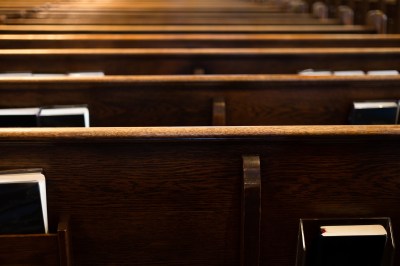As the mother of three teenagers, I often find myself trying to persuade them of things that previous generations took for granted. Most recently, I’ve been attempting to convince my 17-year-old son of the value of attending church on Sunday morning. He’d much rather be on a cross-country trail because, as he puts it, “Running is my church, Mom.”
My son’s skepticism toward organized worship is pretty normal among his peers. Gen Z is widely known to be the least religious generation, with nearly half claiming to have no religious affiliation in a recent survey and only about 1 in 5 reporting weekly church attendance. And while parents can count on the state to enforce school attendance, we’re on our own when it comes to church.
My son is generally a respectful, good kid, so I’m inclined to take him seriously. When he asks me why he has to go church, I believe it’s an honest question. But like any parent, I also recognize his adolescent bent toward social rebellion. So I tell him that, in the year of our Lord 2024, attending Sunday morning church is a form of resistance.
For most of the modern West’s history, going to church hasn’t exactly been revolutionary. Which church you attended might have mattered, but church itself was part of a well-ordered life. To this day, attendance remains highest among those who enjoy social and financial stability. Even so, it is declining across the board, and Sunday morning is increasingly used to catch up on all the things we missed during the week: hearty breakfasts, grocery shopping, home-improvement projects, visiting friends, and maybe even a run. In fact, one of my son’s main objections to attending church is that it takes time away from other activities while adding another event to his already busy schedule. Why would I make him do yet one more thing?
But, as I remind him, one or two hours on Sunday morning isn’t the problem. It only feels like a problem because of the 50 or 60 hours he spends on school and homework every week in addition to 10 or 15 hours on extracurricular activities.
No, church isn’t the problem. But it might be part of the solution.
My son has yet to discover what minority religious groups have long known: Regular worship services carve out space in a hostile world. In fact, church as an act of resistance is key to understanding the story of the black church in America. Long before the civil rights era, Sunday morning church provided a haven where the oppressed could worship freely. Even the practice of wearing one’s “Sunday Best” was a way to fight a culture of dehumanization. Low-paying service jobs might require uniforms throughout the week, but on Sunday morning, maids and mechanics could dress like kings and queens.
In a similar way, “blue laws” protected commercial workers by restricting retail sales and recreational activity on Sunday. So great was the benefit of such laws that the Supreme Court upheld them in McGowan v. Maryland (1961) despite the fact that they were originally linked to religious observance. Not only did the court find that they didn’t violate the establishment clause, they also viewed them as protecting workers by providing “a uniform day of rest for all citizens.”
No, attending church is not just another activity. It’s a form of resistance in a culture that knows no bounds. It is a dam against the churning waters of productivity that would otherwise swallow up every available ounce of time, energy, and emotion. Because as much as regular church attendance carves out temporal space, it also provides worshipers a moment of stillness. It gives us a chance to be … bored.
Our contemporary “fear of missing out” has resulted in us treating our time as billable. Every hour, every minute, every second must count for something. Everything we do must move us toward what poet-philosopher Wendell Berry calls “the objective.” In such a culture, the very suggestion of sitting quietly and being bored for an hour is anathema. Worse still is the relinquishing of individual action—allowing ourselves to be captured by the rhythms and routines of worship. To sit when it is time to sit. To stand when it is time to stand. To kneel when it is time to kneel. To read the responsive reading. To pray and sing together.
It is precisely the monotony and sheer inefficiency of the worship that makes it worthwhile. Go to church because it isn’t productive. Go to church because you don’t understand everything. Go to church because you will be bored. And in this way, maybe you will find a moment of rest. Maybe instead of always needing to act, you can be acted upon.
One of the core beliefs of Christianity is that God works for us because we cannot do what we need for ourselves. We cannot ascend to God, so God comes down to us. We cannot obtain “the objective,” so God extends His grace. In this way, attending a service that doesn’t get us any closer to our own earthly goals might be the best way to capture what faith offers contemporary society. Because here in this hollowed out, protected—dare I say, sacred—space, the demands cease and all that is required is that we participate. Grace comes despite us. We just have to partake.
Not all churches operate this way, of course. Too many have simply baptized the impulses of the surrounding culture, centering production, efficiency, and constant movement. In such cases, regular attendance is only a starting point. The goal is to “get involved,” and more often than not this is code for committing to a flurry of activity—multiple meetings a week, service projects, classes and studies. But ironically, this approach leaves little space for the very practices that set religion apart from more secular endeavors—practices like prayer, introspection, silence, and sabbath. As New York City pastor John Starke notes in The Possibility of Prayer, “Life with God calls for unhurried time that is driven not by accomplishments or tasks but by love and communion. … God gives everything as a gift to those of us who are still and vulnerable enough to receive it.”
Churches, therefore, must remember and reclaim the unique role they play as outposts of grace in an increasingly demanding world. They must guard Sunday morning as a place of refuge, wonder, and presence. A place where we might experience the miraculous because we’ve finally stopped long enough to open ourselves to it.
Recently, our family’s schedule was such that my son got his wish, and Sunday morning found him running a trail instead of sitting in church. But when I picked him up afterwards, he was noticeably irritated—far from the calm, satisfied young man I thought I’d find. Apparently, “the trails are full of people on a Sunday morning, Mom.”
It was hard to tell whether my son was more upset by having to share the course, or by discovering that he wasn’t quite the nonconformist he imagined. Nor are most of us, when it comes down to it. We’re all caught in a whirlpool of busyness and productivity, desperately trying to prove ourselves. Few of us have the wisdom or strength to escape it. But as the calendar turns and we consider the lives we want to live in 2024, let me invite you to join me and my begrudging son in the pew. Perhaps this is the year you carve out a space for a weekly dose of wonder, beauty, and grace. Perhaps this is the year you become more comfortable with sitting still and doing nothing. Or, if nothing else, perhaps this is the year you attend church as a simple, calculated (if not adolescent) way of sticking it to the man.






Please note that we at The Dispatch hold ourselves, our work, and our commenters to a higher standard than other places on the internet. We welcome comments that foster genuine debate or discussion—including comments critical of us or our work—but responses that include ad hominem attacks on fellow Dispatch members or are intended to stoke fear and anger may be moderated.
With your membership, you only have the ability to comment on The Morning Dispatch articles. Consider upgrading to join the conversation everywhere.